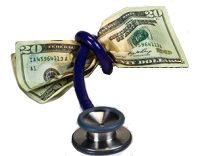Every year your employer will ask you to update the elections for your employee benefits. Unfortunately, not much is provided in the form of guidance to employees even though mistakes can be costly. Here’s one bit of guidance. Contributing to a flexible spending account (FSA) can save you on more than just your medical expenses.
 What are flexible spending accounts (FSAs)?
What are flexible spending accounts (FSAs)?
It’s a medical spending account with funds you contributed to from your paycheck on a pre-tax basis. The FSA is used to pay for out of pocket medical expenses, child care, elective procedures and other qualified expenses. The primary benefit is the tax savings which can be in the thousands if planned properly. Other benefits include a budgeting component which you’ll learn more about below.
How Much Money Can I Save?
Let’s suppose you earn $75,000 annually, you could elect to include $1,000 to pay for your qualified medical expenses with pre-tax dollars. In this case, you would save 35% to 40% in taxes or $350 to $400 if you used the entire contribution amount. Tax Savings = 25% (Federal Tax) + ~5-10% (State Tax) + 5.65% (Social Security/Medicare Tax) = 35-40%.
Note that the contribution amount is set by your employer but starting in 2013, the maximum contribution allowed for employees will be capped at $2,500. That limit does not apply to employer contributions.
Contributing Can Lower Your Ordinary Income Tax Bracket
You may save on more than just your medical expenses. By contributing to the FSA, your taxable income will be reduced by the same amount. This could mean a lot to folks whose taxable income after the FSA contribution brings them to a lower tax bracket. Let’s suppose you are married with a combined income of $195,000 and you contribute $2,500 to reduce your total income to $192,500. This contribution may reduce your ordinary income tax rate from 33% to 28% which in turn will lower your tax rate on short-term capital gains, ordinary dividends and you may now be eligible for certain educational and child tax credits that you weren’t before. Even more, your taxable income will also be lower for alternative minimum tax (AMT) purposes.
Use it or lose it?
The biggest drawback of the FSA is that the amount you contribute must be used during the plan period which is typically the calendar year, although some employers offer a grace period of 2 1/2 months or until March 15 of the following year. If it’s not used, it goes back to your employer. This means that you better be pretty darn careful with the amount you are allocating to your FSA. Don’t use guesswork rather budget by reviewing your out of pocket medical expenses (prescriptions, co-insurance, Co-payments) in the prior years. Look over bank and credit card statements and anticipate future medical expenses such as a new baby. Most of this isn’t rocket science, it’s just writing down the cost and frequency of routine physicals, eye exams, dental appointments and factoring in the seasonal flu and occasional virus.
Any Other Restrictions?
Other than insulin, all over the counter medical purchases are only covered if accompanied with a prescription from your doctor. It’s annoying but make sure your doctor provides you with a prescription for all over the counter drugs such as Tylenol and cold medicine for the year.
What about the medical expense itemized deduction on my tax return?
You can only itemize medical expenses that are in excess of 7.5% of your adjusted gross income which you are unlikely to reach unless a significant medical event occurs during the year. If your income is $100,000, you would need to have medical expenses that exceed $7,500 to deduct anything and this is why it may make sense to explore the flexible spending account (FSA).
More Tax Questions? Browse Answers or Ask Tax Questions Online.
Related Articles
->How Should I Keep My Budget on Track?
->Risks with Health Care Credit Cards
->How Do Changes To The Health Care Law Impact My Grown Children?
->Applying For The Child-Care Tax Credit Even With A High Income
->How Your Credit Report Is Used By Potential Employers


